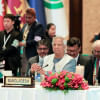Surplus in capital, shortage outside
Colleges in the capital have more teachers than there are posts but government colleges across the country have had teacher shortages for years, said speakers at a conference.
Swarupkathi College in Pirojpur has 56 posts for teachers, of which 26 are vacant, but Sarkari Bigyan College in Dhaka has 48 teachers but it only has 23 posts.
One of the reasons behind this uneven distribution of teachers was their unwillingness to work outside Dhaka, said Education Minister Nurul Islam Nahid while addressing the inaugural session of “Government College Principals' Conference 2016” yesterday.
In presence of the minister and high officials of the ministry and department of higher education, college principals talked about how the shortage of teachers and classrooms were affecting education at government colleges.
Moazzem Hossain, principal of Swarupkathi College said his college had no mathematics and zoology teachers for over three years while the only sociology teacher had been transferred from his college over six months ago.
Abdus Sattar Majumdar said his Boalmari Govt College in Faridpur had no teachers for basic subjects like Bangla, English and botany for months.
However, 14 colleges in Dhaka have more teachers than there are posts, said Prof SM Wahiduzzaman, director (college and administration) of the Directorate of Secondary and Higher Education (DSHE).
Citing examples, he said Dhaka College has 224 teachers against 200 posts, Govt Titumir College has 198 against 174 and Bangla College has 140 against 117.
Principals of the colleges in remote areas suggested that taking measures, like introducing special allowances or making it mandatory for all teachers to work outside metropolitan cities for about three years, could help solve the problem.
They also urged authorities not to transfer teachers to remote areas as punishment.
Minister Nahid, speaking at the conference held at the International Mother Language Institute, criticised the teachers for lobbying for transfers to Dhaka. Almost 80 percent of the teachers, who visit the ministry, go there with requests to be transferred to Dhaka, he said.
“Everybody prefers Dhaka. Should the students outside Dhaka stop studying?” he asked.
The teachers show transfer recommendations from political leaders and ministry officials, he said warning the teachers that a negative impression would be formed against those who lobby for transfer rather than submitting applications online.
In 329 college-level institutions, he said, a staggering 3,474 out of over 15,000 posts of teachers were vacant.
At the programme, the principals of colleges also spoke about the lack of classrooms, inadequate academic and administrative buildings and dormitories for students and other problems.
Principals of colleges in Barisal and Manikganj said they were having trouble running their colleges due to student politics. They alleged that student politics at their colleges were being controlled by non-students.

 For all latest news, follow The Daily Star's Google News channel.
For all latest news, follow The Daily Star's Google News channel. 








Comments